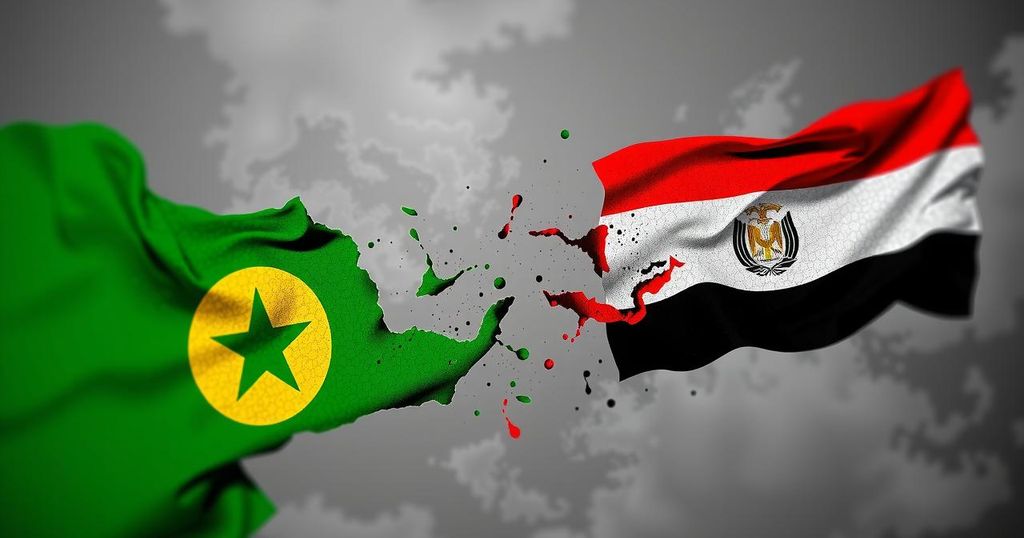Somalia’s Growing Alliance with Egypt Risks Al-Shabaab Resurgence Amidst Ethiopia Tensions

Somalia’s new defense agreement with Egypt threatens to weaken cooperative military efforts with Ethiopia against al-Shabaab, the jihadist group undermining Somalia’s stability. This agreement risks further political fragmentation within Somalia, complicating international security efforts and escalating the threat posed by al-Shabaab. European involvement is crucial to mediating tensions and preventing an increase in violence that could destabilize the Horn of Africa.
The military accord between Somalia and Egypt has intensified tensions with Ethiopia, directly impacting the strategic battle against al-Shabaab, a prominent jihadist organization in Somalia. An attack on a military base in Mogadishu illustrates the ongoing threats posed by al-Shabaab, which continues to control significant areas of the country despite military efforts by Somali and international forces. Strengthening the defense partnership with Egypt may jeopardize essential diplomatic relations and military coordination with Ethiopia, potentially leading to an escalation of instability that al-Shabaab could exploit. The background of this conflict reveals that Somalia has struggled with al-Shabaab’s violent insurgency since 2007, significantly supported by African Union peacekeeping forces. The newly established defense agreement with Egypt raises concerns about Ethiopia’s crucial military role in the region and how it may affect the already fragile political landscape in Somalia. Ethiopia’s military presence is vital for managing al-Shabaab threats, and any attempt to replace its troops with those from Egypt could create a vacuum for further violence. In the context of Somalian state-building, the introduction of foreign military forces complicates an already divided federal and state government dynamic. This may fracture alliances further, as various regional leaders express opposition to any withdrawal of Ethiopian troops, fearing increased vulnerability to al-Shabaab incursions. The evolving tensions not only pose risks to Somalia but could have broader implications for regional stability and the interests of various international stakeholders, including European nations. The European Union (EU) and its member states have significant leverage over regional dynamics due to historical involvement and financial commitments in Somalia. The EU can play a mediating role in alleviating tensions between Cairo and Addis Ababa by leveraging relationships with stakeholders such as Turkey and the UAE, who are active in security operations within Somalia. These efforts are critical, as any deterioration in security could lead to escalated activity by al-Shabaab and jeopardize humanitarian programs in the region. In conclusion, the defense agreement between Somalia and Egypt threatens to disrupt efforts against al-Shabaab by undermining relations with Ethiopia. The risk of increased instability in Somalia necessitates prompt diplomatic intervention from the EU and its partners to prevent further deterioration of security, which might empower al-Shabaab and destabilize the greater Horn of Africa region. Collaboration amongst international actors will be paramount to achieving a cohesive response to these challenges.
The geopolitical landscape involving Somalia, Egypt, and Ethiopia is intricate and fraught with historical animosities. Somalia’s partnership with Egypt, brought about by mutual concerns over Ethiopia’s regional actions, particularly regarding the Grand Ethiopian Renaissance Dam, escalates their respective ties at the potential expense of cooperation with Ethiopia. The precariousness of Somalia’s political unity and military strategy against al-Shabaab, compounded by Egypt’s intentions to increase its military footprint in Somalia, creates a situation ripe for exploitation by militant groups. The presence of Ethiopian troops is presently critical in stabilizing areas threatened by al-Shabaab, whose pervasive influence continues to challenge Somalia’s sovereignty and security efforts.
The escalating defense partnership between Somalia and Egypt, while aimed at bolstering military presence, risks alienating Ethiopia and undermining ongoing anti-al-Shabaab efforts. Without swift diplomatic engagement from international partners, particularly the EU and its allies, Somalia faces the peril of intensified jihadist activity that could have cascading effects on regional stability. The imperative remains to ensure collaborative frameworks that unite various national and international actors to mitigate risks associated with these geopolitical tensions.
Original Source: ecfr.eu








